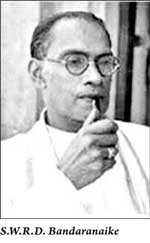Monday Feb 16, 2026
Monday Feb 16, 2026
Saturday, 6 July 2019 00:00 - - {{hitsCtrl.values.hits}}
Do it or not to do it? This seems to be the big question that is being discussed these days on the death penalty. Really it had been an issue dating back to the State Council days in the 1930s.

Suspension of capital punishment had been discussed in the House of Representatives in 1956 and making a statement on that occasion Prime Minister S.W.R.D. Bandaranaike reminded that it had been a subject discussed at “a very great length” in the Legislature of the country.
During the 1952-’56 Parliament a private member’s motion moved by the MP for Kandy, Fred de Silva, had been accepted by a very convincing majority that the death penalty for the offence of murder be abolished.
PM SWRD stated that there is “a definite, a very strong body of opinion, a very large majority of the Members of this House, and members of the public, who would like to see the death penalty abolished”.
At that stage the Government felt it was easier not to abolish the death penalty completely but to introduce a Bill suspending the operation of the death penalty for a period of three years.
Although there was a feeling that the abolition of the death penalty would result in an increase of murders, the PM did not think that it would have any particular effect upon the murder rate. This could be tested by suspending it for three years.
The PM said that murders were committed for economic, temperamental and other factors, the vast bulk had been committed on the spur of the moment, on impulse. “Very few of these are cold-blooded, well-thought-out plots that have resulted in murder.”
“It is a fact that very often the juries in the country were reluctant to convict in cases of murder, even when the evidence is clear for conviction, through the reluctance of sending a man to his death. And therefor even if there is some effect – I do not believe there will be – of encouraging murders by the suspension of this sentence, it will be far more counter-balanced by the other deterrent, namely, of finding a greater proportion of convictions.

“There is also this ingredient to be borne in mind – detection of murder is still rather rudimentary in this country, particularly of recent years murder by shooting has become somewhat fashionable. For instance, a villager for some reason – it may be an economic reason – has an enemy and he wants to get rid of him. So he hires a man – I think the price has now gone down – to murder that enemy. That man sees the villager sleeping in a little hut or out in the open veranda; he surveys the position, takes a gun, shoots the man and goes home.”
He revealed that when he asked for figures of murders by shooting, he found the numbers had gone up suddenly and the figures were most alarming.
He said something interesting about the police: “The police have no proper methods of detection, and particularly where the poor people are concerned – unless some important person is concerned – they do not take sufficient trouble over detection, particularly in cases of murder by shooting which are now becoming alarmingly common, I am sorry to say, at least in certain parts of this country. So that the question of police detection is also valuable in reducing the incidence of this type of crime. All those matters we will consider, are we will do our best to reduce murder apart from the provisions of this Bill and the question of sentence.”